Abstract
Stimulation of human lymphocytes with phytohemagglutinin is known to induce an increase in overall DNA polymerase activity (DNA nucleotidyltransferase; deoxynucleosidetriphosphate:DNA deoxynucleotidyltransferase, EC 2.7.7.7). Previous work [Pedrali Noy, G., Dalprà, L. Pedrini, A. M., Ciarrocchi, G., Giulotto, E., Nuzzo, F. & Falaschi, A. (1974) Nucleic Acids Res. 1, 1183] has shown that two subsequent waves of induction of DNA polymerase can be observed in this system; a first wave occurs in parallel with the increase in DNA replication rate; a second one occurs when the DNA synthesis rate is returned to minimal levels; the second peak is parallel to a maximum in DNA ligase and DNase levels. In the present work we have measured the levels of the DNA polymerases-alpha and -beta in phytohemagglutinin-stimulated lymphocytes during a 12-day period; both enzymes are present at detectable levels at time zero; in correspondence to the peak of DNA synthesis rate (between the fourth and fifth day) a peak of DNA polymerase-alpha is observed, increasing by a factor of approximately 20-fold over the zero time value; subsequently, the level of DNA polymerase-alpha decreases in parallel with DNA synthesis rate. The DNA polymerase-beta is also increased in correspondence to the peak in DNA synthesis rate, but reaches its maximum at later times, between the eighth and tenth day of incubation. The capacity of stimulated lymphocytes to perform repair synthesis following UV damage was measured in the same cells used for the enzyme activity determinations; this capacity also shows two maxima: a first one correlated with the peak in DNA replication rate, and a second one correlated with the peak of DNA polymerase-beta. These data suggest a certain tendency to the specialization of functions in human cell DNA polymerases; the alpha-enzyme seems mainly correlated with DNA replication, whereas the beta-enzyme seems more correlated with the ability of the cell to perform repair type synthesis.
Full text
PDF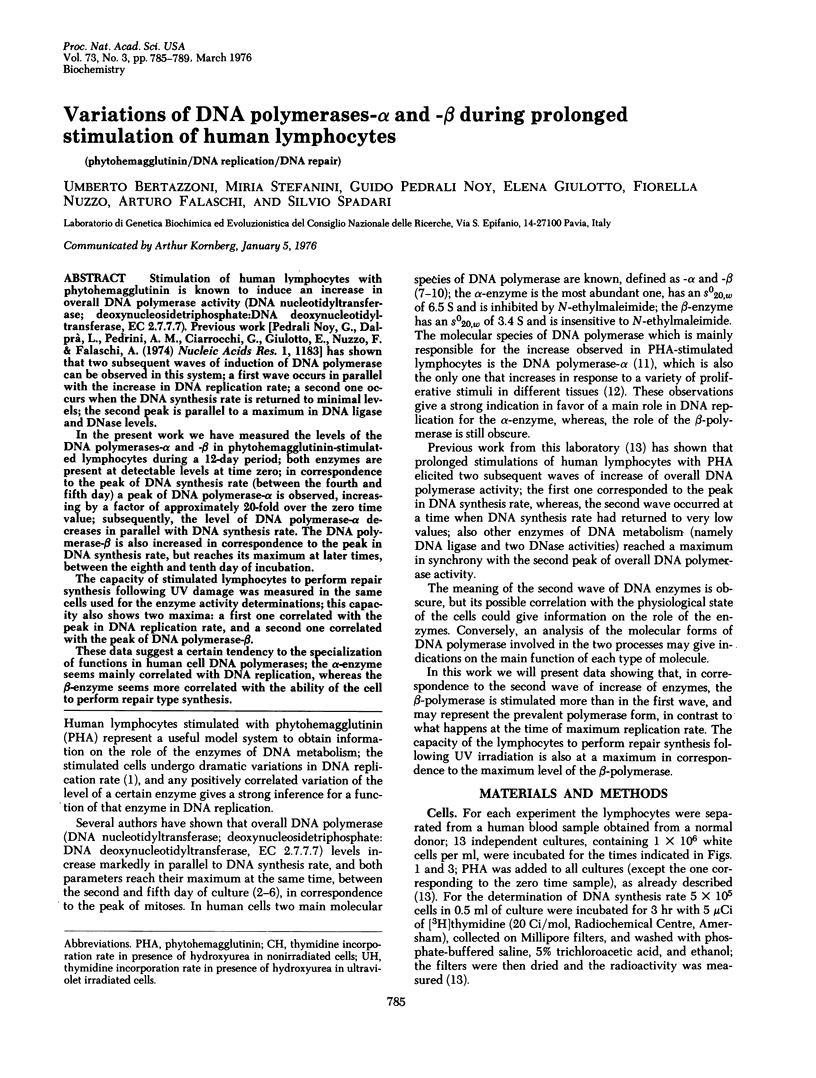
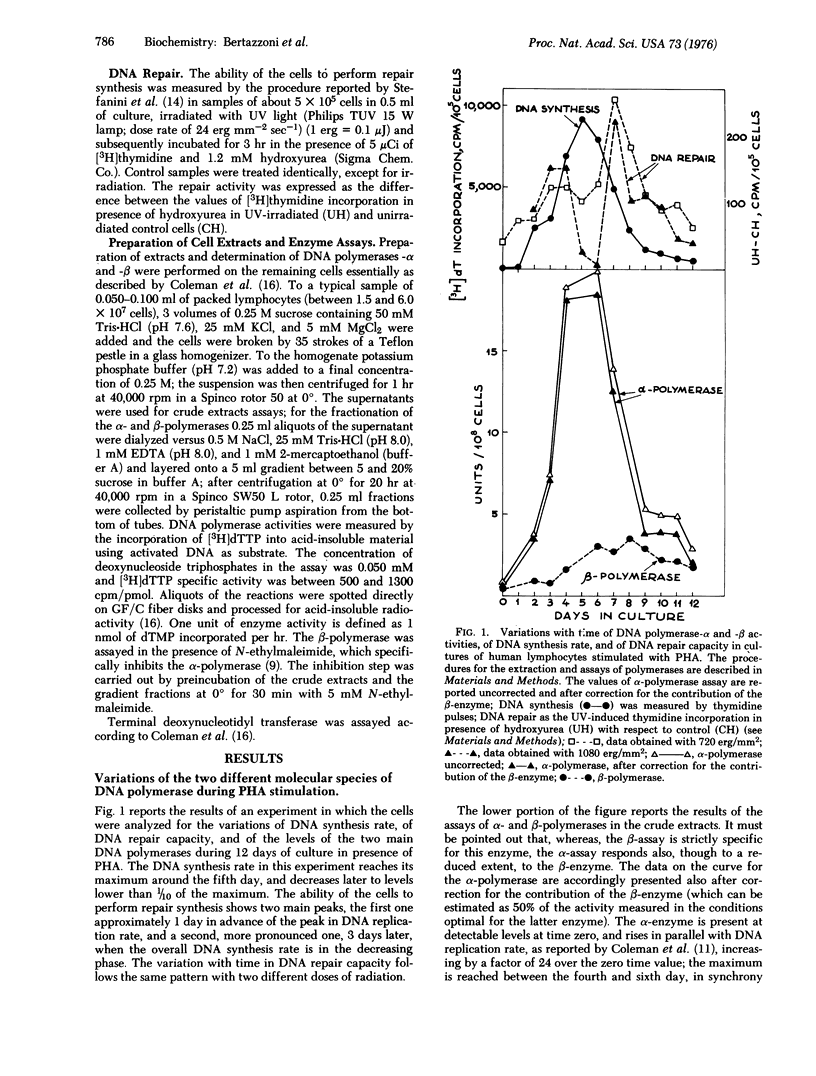
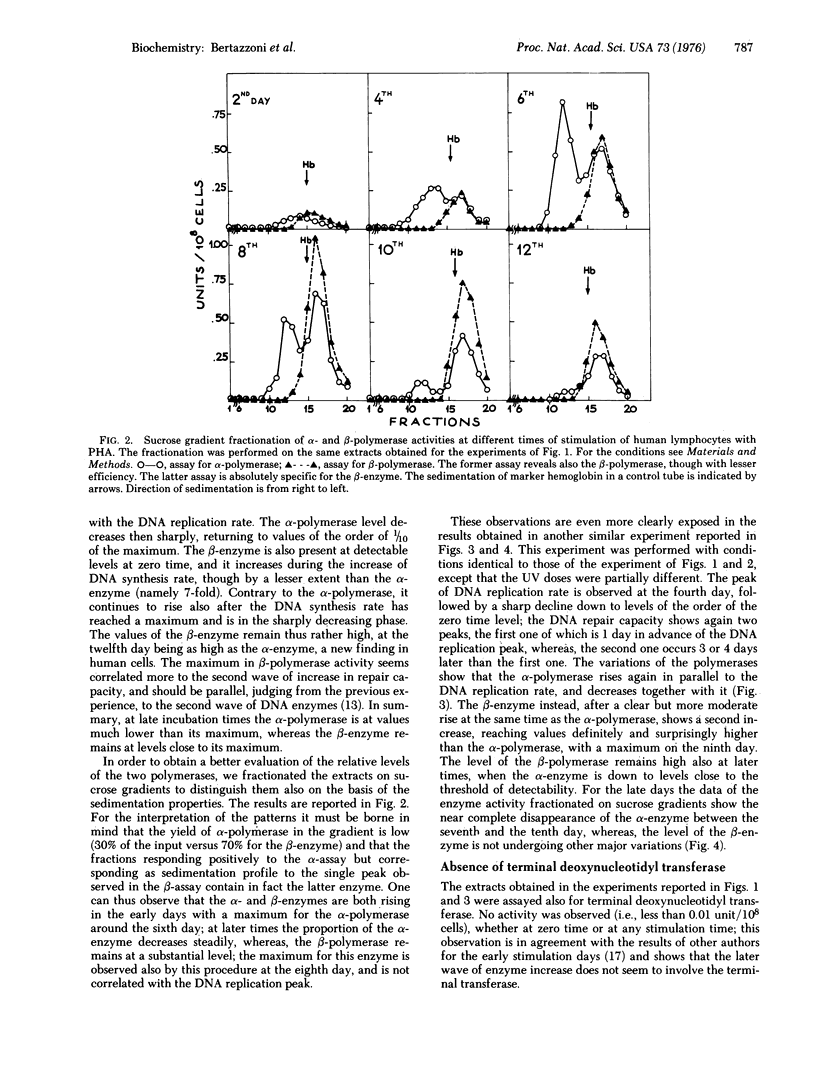
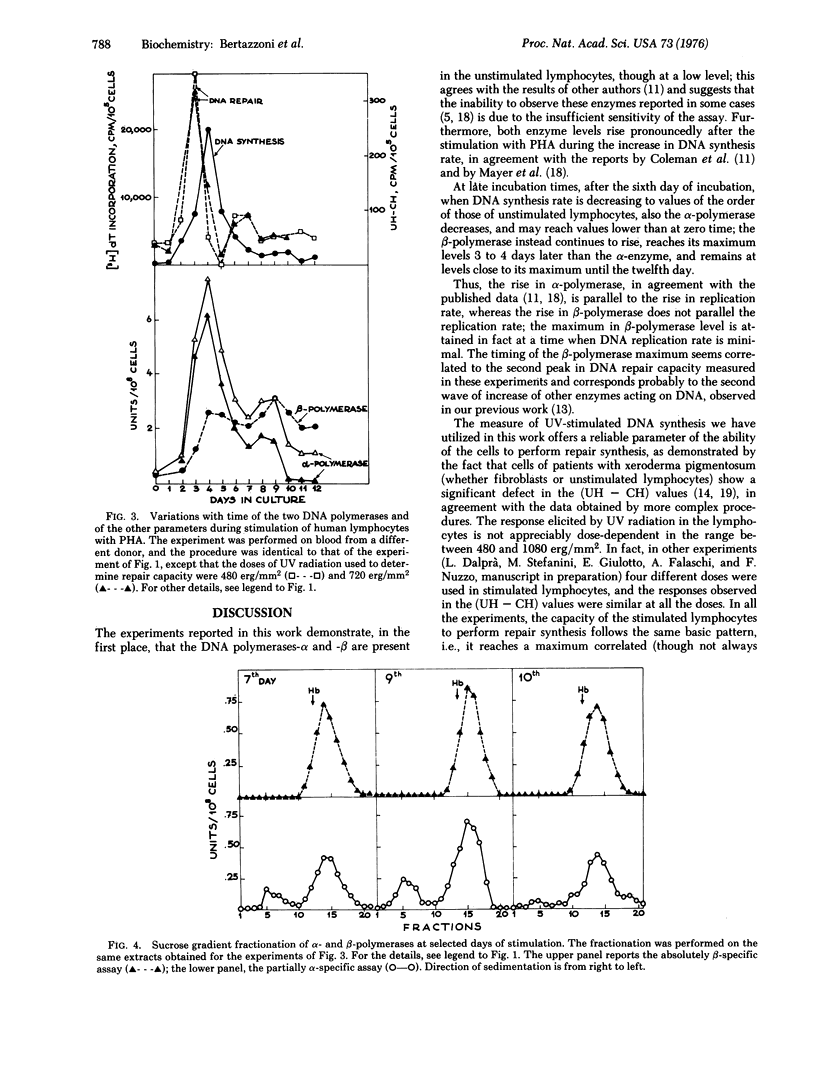
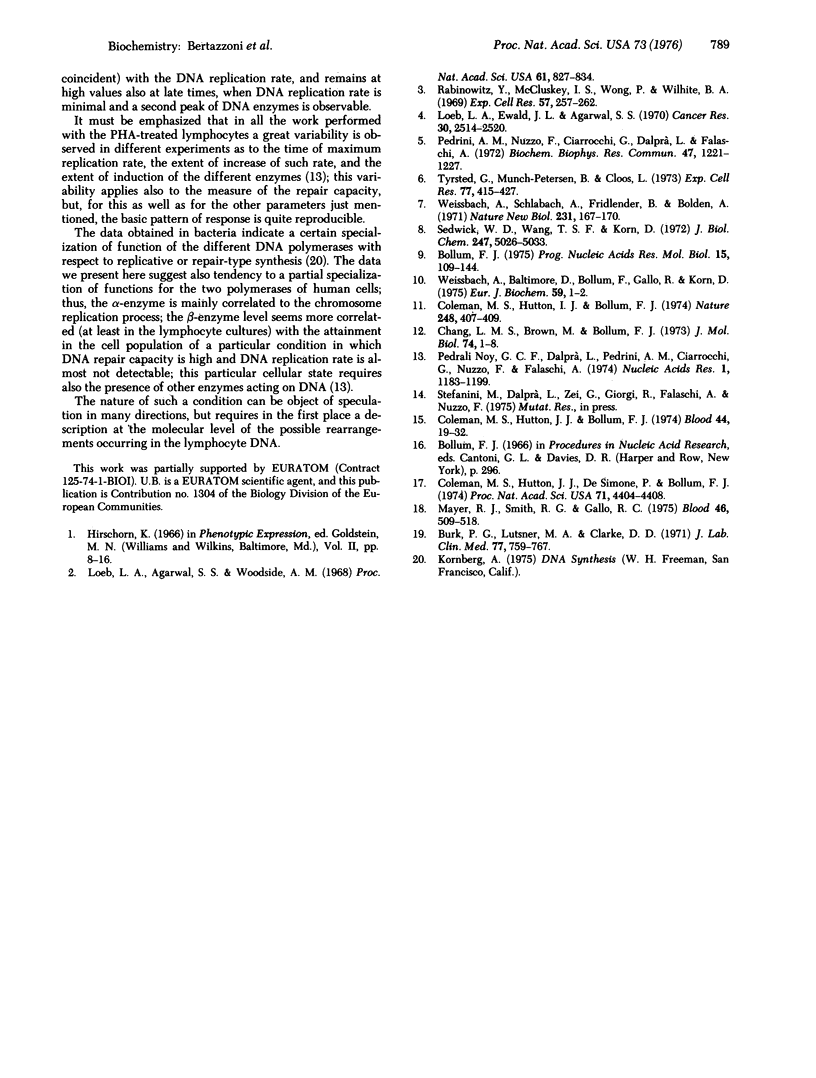
Selected References
These references are in PubMed. This may not be the complete list of references from this article.
- Bollum F. J. Mammalian DNA polymerases. Prog Nucleic Acid Res Mol Biol. 1975;15(0):109–144. doi: 10.1016/s0079-6603(08)60118-x. [DOI] [PubMed] [Google Scholar]
- Burk P. G., Lutzner M. A., Clarke D. D., Robbins J. H. Ultraviolet-stimulated thymidine incorporation in xeroderma pigmentosum lymphocytes. J Lab Clin Med. 1971 May;77(5):759–767. [PubMed] [Google Scholar]
- Chang L. M., Brown M., Bollum F. J. Induction of DNA polymerase in mouse L cells. J Mol Biol. 1973 Feb 15;74(1):1–8. doi: 10.1016/0022-2836(73)90349-5. [DOI] [PubMed] [Google Scholar]
- Coleman M. S., Hutton J. J., Bollum F. J. DNA polymerases in normal and leukemic human hematopoietic cells. Blood. 1974 Jul;44(1):19–32. [PubMed] [Google Scholar]
- Coleman M. S., Hutton J. J., Bollum F. J. Terminal riboadenylate transferase in human lymphocytes. Nature. 1974 Mar 29;248(447):407–409. doi: 10.1038/248407a0. [DOI] [PubMed] [Google Scholar]
- Coleman M. S., Hutton J. J., De Simone P., Bollum F. J. Terminal deoxyribonucleotidyl transferase in human leukemia. Proc Natl Acad Sci U S A. 1974 Nov;71(11):4404–4408. doi: 10.1073/pnas.71.11.4404. [DOI] [PMC free article] [PubMed] [Google Scholar]
- Loeb L. A., Agarwal S. S., Woodside A. M. Induction of DNA polymerase in human lymphocytes by phytohemagglutinin. Proc Natl Acad Sci U S A. 1968 Nov;61(3):827–834. doi: 10.1073/pnas.61.3.827. [DOI] [PMC free article] [PubMed] [Google Scholar]
- Loeb L. A., Ewald J. L., Agarwal S. S. DNA polymerase and DNA replication during lymphocyte transformation. Cancer Res. 1970 Oct;30(10):2514–2520. [PubMed] [Google Scholar]
- Mayer R. J., Smith R. G., Gallo R. C. DNA-metabolizing enzymes in normal human lymphoid cells. VI. Induction of DNA polymerases alpha, beta, and gamma following stimulation with phytohemagglutinin. Blood. 1975 Oct;46(4):509–518. [PubMed] [Google Scholar]
- Noy G. C., Dalpra L., Pedrini A. M., Ciarrocchi G., Giulotto E., Nuzzo F., Falaschi A. Evidence for two waves of induction of DNA enzymes in stimulated human lymphocytes. Nucleic Acids Res. 1974 Sep;1(9):1183–1199. doi: 10.1093/nar/1.9.1183. [DOI] [PMC free article] [PubMed] [Google Scholar]
- Pedrini A. M., Nuzzo F., Ciarrocchi G., Dalprà L., Falaschi A. Induction of polynucleotide ligase in human lymphocytes stimulated by phytohemoagglutinin. Biochem Biophys Res Commun. 1972 Jun 9;47(5):1221–1227. doi: 10.1016/0006-291x(72)90965-5. [DOI] [PubMed] [Google Scholar]
- Rabinowitz Y., McCluskey I. S., Wong P., Wilhite B. A. DNA polymerase activity of cultured normal and leukemic lymphocytes. Response to phytohemagglutinin. Exp Cell Res. 1969 Oct;57(2):257–262. doi: 10.1016/0014-4827(69)90149-9. [DOI] [PubMed] [Google Scholar]
- Sedwick W. D., Wang T. S., Korn D. Purification and properties of nuclear and cytoplasmic deoxyribonucleic acid polymerases from human KB cells. J Biol Chem. 1972 Aug 25;247(16):5026–5033. [PubMed] [Google Scholar]
- Tyrsted G., Munch-Petersen B., Cloos L. DNA polymerase activity in phytohemagglutinin-stimulated and non-stimulated human lymphocytes. Exp Cell Res. 1973 Mar 15;77(1):415–427. doi: 10.1016/0014-4827(73)90596-x. [DOI] [PubMed] [Google Scholar]
- Weissbach A., Baltimore D., Bollum F., Gallo R., Korn D. Nomenclature of eukaryotic DNA polymerases. Eur J Biochem. 1975 Nov 1;59(1):1–2. doi: 10.1111/j.1432-1033.1975.tb02416.x. [DOI] [PubMed] [Google Scholar]
- Weissbach A., Schlabach A., Fridlender B., Bolden A. DNA polymerases from human cells. Nat New Biol. 1971 Jun 9;231(23):167–170. doi: 10.1038/newbio231167a0. [DOI] [PubMed] [Google Scholar]


